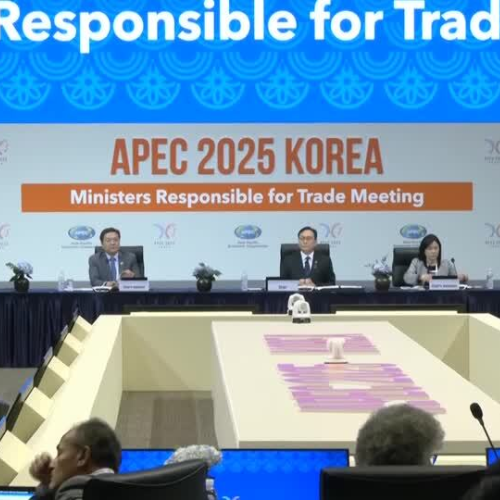The Asia-Pacific Economic Cooperation, or APEC, is a group of 21 countries that includes some of the world’s biggest economies, such as the United States, China, Japan, and South Korea. Together, these countries account for nearly half of all the trade happening worldwide.
At a recent meeting in South Korea, APEC warned that exports in the region will barely grow this year—expected to increase by only 0.4%, compared to a much stronger growth of 5.7% last year. The overall economic growth in the region is also expected to slow down, from a previous forecast of 3.3% to just 2.6%.
This slowdown is mostly due to new tariffs, which are taxes on imported goods, announced by the United States. Tariffs make goods more expensive and reduce how much companies and consumers want to buy from other countries. Because of these tariffs, trade between APEC countries is slowing sharply, threatening the fast growth seen over the last few decades.
APEC also said that demand for goods from outside the region is dropping, especially for manufactured products like electronics and cars, as well as everyday consumer goods. Services trade—which includes things like tourism, financial services, and transportation—is also being affected because businesses are uncertain about future rules and costs.
Vietnam Scrambles to Clean House as America Threatens 46% Tariffs Over Counterfeits
Important Trade Talks Take Place
While the trade ministers gathered in South Korea, important talks took place on the sidelines between trade officials from the United States and China. These two countries have been involved in a trade war for several years, which has caused many disruptions globally.
The recent meeting came shortly after an earlier round of talks in Geneva, where both sides agreed to reduce some of the steep tariffs that have caused tension and hurt business. Although the officials did not reveal many details, it was confirmed that the discussions aimed to calm the trade conflict.
The U.S. tariffs cover more than half of the APEC member economies. This is a big change from earlier years when APEC countries worked hard to lower tariffs and increase trade. For example, average tariffs in the region had fallen from 17% in 1989 to just 5.3% by 2021. This reduction helped trade grow more than nine times over that period.
Besides discussing tariffs, the officials also talked about reforming the World Trade Organization (WTO), the global group that manages trade rules. The WTO has faced criticism recently, especially from the United States, which has paused some funding to the organization. Many believe reform is needed to keep the system fair and effective.
Ripple Effects Across the Region and Beyond
The impact of tariffs is being felt beyond just goods trade. APEC officials said that services like travel, finance, and shipping are also seeing the effects. Businesses find it harder to make plans because they don’t know what tariffs or trade rules might change next. This uncertainty slows down investment and growth.
First Signs of U.S.-China Tariff War Reset: Boeing 737 Gains Re-Entry into Chinese Market
The South Korean trade minister, who hosted the meeting, said that the global economy and trade are under extra pressure from these uncertainties. He urged countries in the APEC group to keep talking and work together to solve these challenges.
The U.S. trade representative also held talks with counterparts from South Korea, New Zealand, and other Asian countries. He even met with the heads of major South Korean shipbuilding companies to explore ways the U.S. and South Korea could work together in this important industry.
Trade ministers and representatives from other APEC members, including Japan, Canada, Mexico, and Russia, also participated in the talks. Despite the difficulties, APEC members are trying to continue cooperating on trade and economic issues.
This meeting is part of a series leading up to the main APEC leaders’ summit, planned later this year in South Korea. APEC remains a major player in the global economy, representing about 60% of the world’s total economic output.
For now, the clear message from APEC is that trade growth is stalling, and tariffs are a big part of the problem. The rising costs and uncertain policies are making it harder for countries to do business as they once did, causing a ripple effect that affects goods, services, and financial markets throughout the region.


